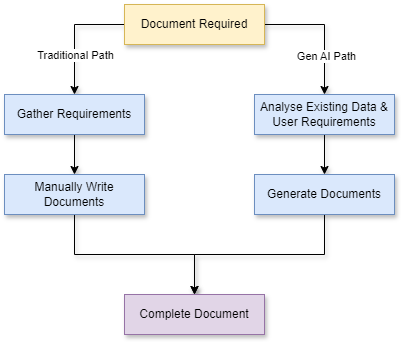The Generative Revolution: How AI is Reshaping Business Analysis
Imagine a world where tedious documentation writes itself, data analysis happens in a flash, and initial stakeholder interviews are conducted by AI assistants. Generative AI (Gen AI) is rapidly transforming the field of business analysis, automating tasks and empowering analysts to become strategic powerhouses.
Business analysts are the backbone of any IT project, acting as a bridge between business needs and technical solutions. They gather requirements, analyze data, and ensure projects deliver value. But in today’s fast-paced digital world, traditional methods can be time-consuming and limit what analysts can achieve.
This is where Gen AI steps in. Gen AI is a branch of Artificial Intelligence that focuses on creating new content, from text formats like emails and reports to creative content like poems and code. It can analyze vast amounts of data and learn patterns, allowing it to generate human-quality outputs.
How is Gen AI Revolutionizing Business Analysis?
Gen AI’s capabilities offer a treasure of possibilities for business analysts. Here are some key areas where it’s making a significant impact:
-
- Automated Documentation Generation: Imagine never having to write another user story or data flow diagram manually! Gen AI can analyze existing data and user requirements to automatically generate comprehensive reports, user stories, and other essential documentation. This frees up analysts’ time for crucial tasks like in-depth stakeholder interviews and process improvement initiatives.

-
- Data Analysis & Insights Generation: Business analysts spend countless hours sifting through data, searching for trends and patterns. Gen AI can analyze large datasets with lightning speed, identifying hidden insights and anomalies that might be missed by manual analysis. This allows analysts to focus on interpreting the data, drawing conclusions, and translating them into actionable recommendations for stakeholders.
- Improved Requirements Gathering & Elicitation: The initial stages of a project often involve lengthy stakeholder interviews to understand their needs. Gen AI chatbots can streamline this process by conducting initial interviews, gathering user needs, and identifying pain points. This allows business analysts to focus on deeper dives with key stakeholders, clarifying complex requirements, and ensuring a clear understanding of project goals.
- Scenario Planning & Risk Assessment: Predicting how a project might unfold under different circumstances is a critical aspect of business analysis. Gen AI can be used to generate various business scenarios based on market trends, competitor analysis, and user behavior. This allows analysts to proactively assess potential risks, identify areas for improvement, and develop mitigation strategies before problems arise.
Real-world Examples:
While Gen AI is a relatively new technology, several businesses are already reaping the benefits. For instance, a leading insurance company is using Gen AI to automate the generation of customer reports, freeing up analysts to focus on developing personalized risk management plans. Another company in the retail sector is leveraging Gen AI chatbots to conduct initial customer interviews, allowing analysts to dedicate their time to analyzing customer feedback and identifying product improvement opportunities.
The Future of Business Analysis with Gen AI
The integration of Gen AI into business analysis practices holds immense promise. Here’s what we can expect:
-
- Increased Efficiency and Productivity: By automating repetitive tasks, Gen AI allows analysts to focus on higher-value activities, leading to significant gains in efficiency and productivity.
- Enhanced Data-Driven Decision Making: Gen AI’s ability to analyze vast datasets and generate insights empowers analysts to make data-driven recommendations with greater confidence.
- Improved Stakeholder Communication and Collaboration: Automated documentation and streamlined requirement gathering lead to better communication and collaboration between business analysts and stakeholders.
- Exploring a Wider Range of Business Scenarios: Gen AI allows analysts to explore a wider range of possibilities, leading to more robust project planning and mitigation strategies.
Challenges and Considerations
As with any new technology, adopting Gen AI comes with its own set of challenges. Here are some key considerations:
-
- Training Data: Gen AI models require robust training data to ensure accurate outputs. Business analysts will need to be involved in curating and validating the data used to train Gen AI tools specific to their needs.
- Potential Bias: AI models can inherit biases from the data they are trained on. Business analysts need to be aware of this potential bias and take steps to mitigate it through careful data selection and model evaluation.
- Integration with Existing Tools: Integrating Gen AI with existing business analysis tools and workflows will be crucial for seamless adoption.
- Continuous Learning: The field of Gen AI is constantly evolving. Business analysts will need to commit to continuous learning to stay updated on the latest advancements and leverage them effectively.
The Call to Action
The rise of Gen AI presents an exciting opportunity for business analysts. By embracing this technology and exploring its capabilities, analysts can become even more valuable assets within their organizations. Here’s how they can get started:
-
- Explore Gen AI Tools: Research and explore Gen AI tools available in the market specifically designed for business analysis tasks. Some popular options include Chatgpt, Jasper, Claude, and Gemini.
- Experiment and Learn: Encourage business analysts to experiment with these platforms. Many offer free trials or limited access, allowing them to discover how Gen AI integrates seamlessly into their existing processes.
- Stay Updated: The Gen AI landscape is constantly evolving. Business analysts can subscribe to industry publications, follow thought leaders, and attend webinars to stay updated on the latest advancements and best practices for applying Gen AI to business analysis.
- Become a Gen AI Champion: By advocating for the use of Gen AI within their organization, business analysts can become champions of innovation. Sharing their learnings and experiences with colleagues and stakeholders can highlight the potential for improved efficiency, data-driven decision-making, and overall business value.
By taking these steps, business analysts can position themselves as a leader in the adoption of Gen AI within their organization and future-proof their skills as business analysts in the age of generative technology.

